#Indian Country Today
Explore tagged Tumblr posts
Text
“why would elaena marry a dornishman when they’re nasty evil people who murdered her poor innocent brother daeron”
maybe because once elaena grew up she realized that there were better ways of bringing dorne into the realm than violent conquest, and that daeron got the death he deserved from not just a nobility that is valid for fearing subjugation from valyria but also a smallfolk sick and tired of these people showing up every few decades to set their principality on fire, and put aside any anti dornish sentiments she may or may not have harbored as a child to see the way her family had directly attributed to their suffering, eventually even falling in love with and marrying a dornish man??
also, considering daeron ii attempts a type of proto-reparations act in bringing dorne into the kingdom, it’s not out of the realm of possibility that someone as intelligent as elaena would recognize the inherent racism in the targaryen conquest of dorne and especially considering the very loud anti-dornish, deeply anti intellectual faction in the blackfyre rebellions, realized they wouldn’t be kind or understanding of an intelligent woman like herself and had no interest in herself or her daughters (of which she had four!!) getting shoved back into the maidenvault again?
like, daeron i is on some andrew jackson manifest destiny shit, and if it makes me an asshole for thinking “god i wish someone had merked jackson before he genocided & displaced my ancestors, good on the dornish for realizing you can’t negotiate with imperialists” than i am perfectly comfortable being considered an asshole right next to my girl elaena.
#everyone discoursing about the young dragon. listen. they should have tortured him before they killed him too.#anti daeron i targaryen#valyrianscrolls#anti house targaryen#idk just in case. clearly i’m not anti everyone i’m complimenting elaena & daeron ii#elaena targaryen#daeron the good#daeron ii targaryen#getting on my soap box#dorne#also when i say ‘my ancestors’ i mean that jackson passed the indian removal act specifically to remove my tribe (and several others) bc#white people in the midwest didn’t like that we wouldn’t leave.#my tribe managed to work somethjng out and only had to move a couple miles away from our homelands. others in our area were forcibly mkced#*moved. look up the potawatomi trail of death. they marched them thru illinois’ capital. dozens including children died.#also read about the fort dearborn massacre. and rising up from indian country which makes the argument that it wasn’t a massacre#but a battle bc white americans had been raiding potawatomi villages for weeks. so the potawatomi struck back and people to this day insist#it was a massacre just bc the potawatomi were better at fighting than the americans. nah.#u don’t get to wage a war of conquest on an innocent and indigenous population just to turn around and say they were mean for fighting back.#i’m sorry i woke up today and decided to choose violence. i’m in an awful mood aksjdjd
130 notes
·
View notes
Text
He's back

#Have stopped myself from posting stuff close to my heart about my faith ever since some mf hurled hatred towards Diwali greetings on here#That was 4 years ago#Not going to stop myself today#Today Siyavar Ramchandr Ji is coming back home to HIS abode after 5 centuries#One time on desiblr I saw an Indian history student show off their notes. Among the near flawless handwritten words was this question#Why did Hindus keep on building the temples even after being plundered and desecrated by Islamist invaders?#Seeing the mood in my country- in the world- in my own self- this is the feeling they built them temples for#Oldest- the longest surviving religion- most humble and tolerant of them all#we're so back#Negative comments on this app will never dampen your spirit- Ram is here to show the way✨#Jai Shree Ram#Ram mandir
6 notes
·
View notes
Text
Most of the information here is correct, but esk*mo meaning snow eaters (or another common one is ‘eaters of raw meat’) is actually a misconception. Although there are mixed opinions on the exact origin, the most accepted one right now by linguists is that it comes from the French word esquimaux, meaning “one who nets snowshoes.” The word is still a slur and definitely don’t use it if you’re not Indigenous to the circumpolar region, but Nēhiyo/Cree have nothing to do with it.
Also, though the Inuït are the biggest Indigenous group in the circumpolar region, it is also home to the Yup’ik and Unangax̂ peoples!
source:
Folks, friends, y’all…. esk*mo is a slur. I understand a lot of people don’t know that, I don’t want to be a dick about it, but I’ve been seeing it in fics. Wanna write “esk*mo kisses”? Just say “nuzzled noses” or something.
I’m not here to call anybody out, it’s been in multiple fics, I’m not vague posting. This is just a psa. 👍🏻
#i originally found out abt this in indian country today but i couldn’t find the article 🥲#i don’t want to overstep bc again it’s mostly correct#but there’s a bit of misinformation#indiginous#inuït#iñupiaq#aleut#yup’ik#Unangax̂#inuktitut#nêhiyawewin
248K notes
·
View notes
Text
I've seen little about it so, Just an FYI what's been unfolding in England today. Far-right protestors are literally trying to kill asylum seekers in hotels.
In Rotherham, Yorkshire fascists have tried to set a hotel on fire with migrants staying there. Some signalling cut-throat gestures at the people staying in the rooms.


In Tamworth, Staffordshire the very same thing is happening. Another hotel has been set on fire with asylum seekers still inside alongside racist graffiti.


Other similar protests that are going uncountered are happening in Middlesbrough, Hartlepool, Stoke-on-Trent and many more areas, chances are there will be one somewhere by you if things keep going the way they are. Nazis are literally strolling about unchallenged and these people are marching happily with them. There are more sensitive videos online which I won't share here but there are groups of nazis chasing down and circling black people in cities and beating them up, indian and chinese takeaways being targetted, turkish barbers being set alight and there have been incidents of muslims being assaulted and even stabbed.

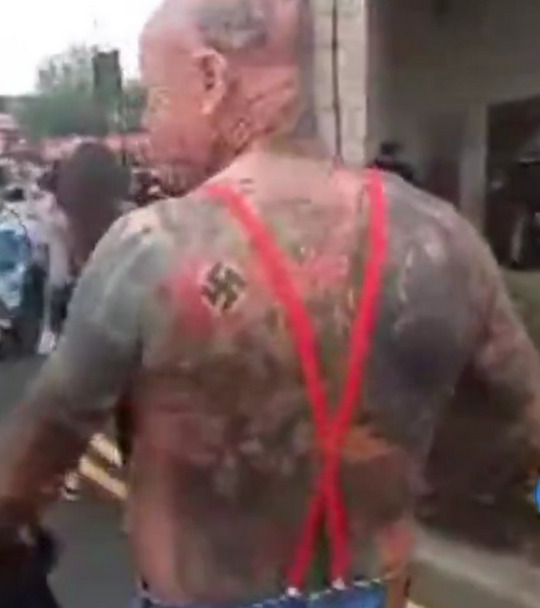


BUT... There are success stories from UK cities where riots have failed due to no turnout or due to antifascists driving far-right pricks out of the city.
Cardiff, Wales - About 5 fascists turn up compared to 500 conuter-protestors. They failed to get anyone here despite trying two times.
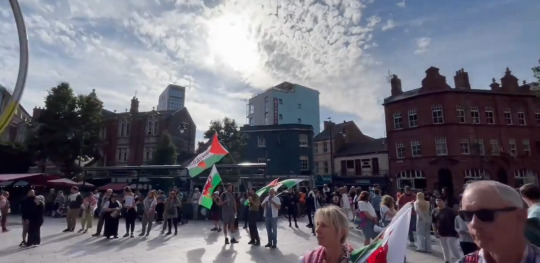
Liverpool, Merseyside - A significant EDL mob is marched out of the city and fought against. Counter-protestors form a ring around a mosque being targetted.

Bristol, City of - antifascists block the entrance to a hotel that nazis are trying to get into as well as a fierce citywide push against the EDL and racism.
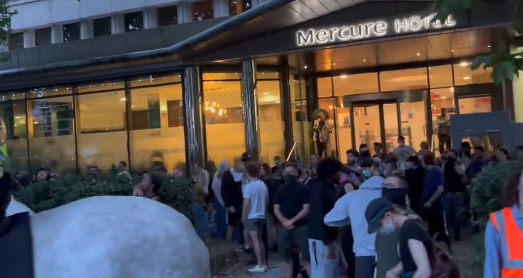
Nottingham, East Midlands - A huge antifascist counter protest outnumbers EDL and the far-right, preventing a riot from occuring.

There are many many more of these riots planned. If you're in the UK get organised and be prepared to fight alongside the people who make our communities stong and resiliant and make our country and cities a wonderful vibrant and friendly place to be. Help by whatever means you can. If you are not from the UK then please signal boost this because this needs to stop this nastiness from spreading and to make nazis afraid again.
24K notes
·
View notes
Text

#Chandrayaan-3#the third lunar mission of the Indian Space Research Organization (ISRO)#made a soft landing on the Moon.#World victorious tricolor dear#now the moon is ours🚀🇮🇳#India became the first country in the world to successfully reach the south polar region of the Moon. The landing of Chandrayaan-3 created#today is a proud day for India.#This historic and proud achievement is a symbol of determination#hard work and sacrifice of our scientists.#Congratulations to the countrymen and the entire ISRO team associated with Chandrayaan-3 and best wishes for the future.#ISRO#Chandrayaan3#Chandrayaan3Landing#VikramLander#दीनबंधुसरछोटूरामधाम#JatSewaSangh
1 note
·
View note
Text
Modi did not do liquor business

Union Minister Kishan Reddy criticized the BRS Sabha in Khammam as if they had dug a hill and caught a rat. Condemning the comments made by KCR in this House, he expressed his anger. However, they said that it is KCR's habit to praise the neighboring countries and curse the Indian Army. He informed that the reason for the establishment of fertilizer factory in Telangana is the 'Make India' program started by the BJP government.
#telugu times#KCR#modi#Liquor Business#Khammam#BRS#Indian Army#International countries#Fertilizer#Factories#Telangana#BJP#government#latest news#Politics#Today news update
0 notes
Text
India’s $13.9 billion aviation industry—projected to cater to over 300 million domestically by 2030—is a ticking time bomb.
This July, in the sweltering heat at the Delhi High Court, additional solicitor general Aishwarya Bhati announced that new rules on pilot duty and rest periods would not be implemented this year after all. Introduced by the Directorate General of Civil Aviation (DGCA) in January, the rules were designed specifically to combat pilot fatigue. They were set to take effect in June, but were abruptly retracted. The hearing addressed a writ petition filed by the Federation of Indian Pilots (FIP), seeking clarity on when the new norms would be enforced. The DGCA’s response followed its request to airline companies in April for a tentative implementation timeline.
Concerns over pilot fatigue had been mounting in the months leading up to the announcement of the new Flight Duty Period, Flight Time Limitations, and Prescribed Rest Periods by the DGCA. The urgency deepened in November 2023 when a 37-year-old Air India pilot, Captain Himanil Kumar, collapsed at Delhi Airport while training to fly the airline's Boeing 777 fleet, and later died at the hospital. Kumar was the second Indian pilot to die on duty within three months; in August, Captain Manoj Subramanyam, a 40-year-old IndiGo pilot, suffered a fatal cardiac arrest just minutes before his flight from Nagpur.
These back-to-back tragedies raised alarm in the industry. “Another young Indian pilot passed away today due to a suspected cardiac event,” reportedly tweeted Captain Shakti Lumba, a retired IndiGo VP who is now the president of the Professional Pilots Society in India (His tweet was since deleted.) “If this doesn’t convince the DGCA, civil aviation ministry, and airlines to urgently address the stress, fatigue, and anxiety among pilots, nothing will.”
The DGCA, India’s aviation watchdog, regulates the country’s Flight Duty Time Limitations (FDTL). At 13 hours of flight duty time, India’s FDTL is already demanding, but after the pandemic slowdown, increased route expansion and pilot shortages have forced many to fly beyond the recommended maximum of 60 hours a week, exacerbating crew exhaustion. The DGCA finally responded to the growing crisis by revising FDTL norms in January 2024.
The new guidelines increased weekly rest periods from 36 to 48 hours and introduced quarterly fatigue reports. Its scheduled implementation on June 1, 2024, was pushed back due to pressure from operators. An airline CEO, speaking anonymously to the Economic Times in January, claimed the proposed regulations would require a 20 percent increase in pilot numbers, which would escalate expenses and lead to huge numbers of flight cancellations. Still, the DGCA held firm on the FDTL implementation deadline till early March. By the end of the month, however, it appeared to have yielded to influence from the airline lobby. A notice on the regulator’s website announced the deadline had been deferred, without providing a reason or setting a new date.
The pilot fatigue problem isn’t unique to India. In January, two pilots for Indonesia-based Batik Air fell asleep for 28 minutes mid-flight, causing their plane to veer off course between Sulawesi and Jakarta. In April, unionized Virgin Atlantic pilots in the UK voted 96 percent in favor of pursuing an industrial action in response to rising fatigue. Earlier, the CEO of Wizz Air UK faced a backlash for urging crew members to push through their fatigue to avoid flight cancellations. In May, senior pilots at Virgin Australia raised safety concerns, claiming rostering systems were pushing them "to the limits.”
But in India, the belief that overwork and fatigue are not just acceptable but essential has become entrenched across industries. The aviation crisis is just the tip of the iceberg; it is the tech industry that is leading the charge. Last year, Infosys cofounder Narayana Murthy suggested that Indian youth should work 70 hours a week for the nation's development. Murthy’s advice came up at the Indian Parliament on the first day of its winter session and found support from a list of influential Indian tech leaders, including Bhavish Aggarwal, founder of India’s first AI unicorn, Ola Krutrim; Ayushmaan Kapoor, cofounder of the AI-powered customer platform Xeno; and even veterans like Sajjan Jindal, CEO and MD of JSW Group, and Vinod Khosla of Sun Microsystems. Almost all of them justified the extended work hours, which far exceed the maximum eight to nine hours per day stipulated by the International Labour Organisation and the Indian Labour Code, as necessary for strengthening India’s economy. “We have to make India an economic superpower that we can all be proud of,” Jindal wrote on X. He cited Indian prime minister Narendra Modi, “who works 14-16 hours everyday,”as a model. In July this year, the Karnataka State IT/ITeS Employee Union said the state government had plans to increase working hours in the sector from the current maximum of 10 hours (including overtime) to a staggering 14 hours a day. As the union planned massive campaigns to oppose the move, the labor minister stated that the push for the proposal had come from the companies.
The airline companies think they have a solution to the fatigue crisis: technology. IndiGo, India’s largest airline, announced it would be an “early adopter” of a wrist-worn fatigue-monitoring device it was developing with French defense and aerospace company Thales Group. The device can provide “detailed insights into demographic data, including routes, pairings, crew profiles, and more, going beyond traditional scheduling-focused biomathematical models,” the airline stated in a press release in September. The airline, which operates 2,000 flights daily and employs over 5,000 pilots, said the device would be rolled out after a proof-of-concept trial. No date for the rollout was announced.
Wearable activity trackers are not new to the aviation industry. IndiGo’s device sounds similar to Actiwatch, a now-discontinued line of research-grade actigraphs from Philips, used to monitor sleep patterns, study circadian rhythms, and track physical activity as part of an airline’s fatigue risk-management system. But they partly rely on performance tests and subjective measures, such as self-reporting, which often results in being targeted by the airlines, says Captain C. S. Randhawa, president of the Federation of Indian Pilots. Safety management systems on the whole tend to be neglected by operators and are viewed as an additional expense, says Captain Amit Singh of the NGO Safety Matters Foundation.
In May 2023, Air India launched safety management software called Coruson, as well as BAM (Boeing Alertness Model), a fatigue-mitigation tool integrated into its rostering system, which is used by airlines to create and manage pilot schedules. Coruson, developed by cloud software company Ideagen, centralizes, analyzes, and reports on safety-related data—such as incidents, hazards, and risk assessments. BAM, developed jointly by Boeing and the software company Jeppesen, predicts and manages pilot fatigue by analyzing flight schedules and performance data. These tools were designed to prevent the creation of fatiguing rosters and pairings, Air India CEO Campbell Wilson noted in an internal message to employees. The carrier also introduced two new digital tools for its crew—the Pilot Sector Report app, to help pilots easily submit information on flight performance, incidents, and observations post-flight; and DocuNet, a digital management system that facilitates the storage, retrieval, and sharing of documents (such as flight manuals, training records, and compliance documents).
Despite these measures, the airline was fined by the DGCA in March this year for violating FDTL limits and fatigue management rules. This May, Air India Express cabin staff called in sick en masse to protest against “mismanagement.” This followed a similar protest from the crew, mostly pilots, at Vistara airlines. Both Air India and Vistara are now owned by one of India’s largest conglomerates, the Tata Group, which took over the former from the Indian government in January 2022.
Twenty-five of those who called in sick at Air India Express were terminated. Others were reportedly served an ultimatum. Those sacked were later reinstated by the airline following an intervention by the chief labour commissioner. Nearly a week before, the regional labor commissioner of Delhi had allegedly written to the Tata group chairman pointing to “blatant violations of labour laws” and insisting the legitimate concerns of the cabin crew be looked into. According to CNBC, Vistara employees said the agitation at their end had to do with recent salary updates, which fixed pilot pay at 40 flight hours—down from 70. Protesting first officers claimed that the new salary structure would result in an almost 57 percent pay cut. Under the new terms they would also have to fly up to 76 hours to earn what they were previously earning at 70 hours.
To placate the pilots and get them back to work, management had assured them that salaries for the “extra working hours” would be credited once Vistara was integrated with Air India. At the time, two Air India pilots unions had written to the chairman of the company, saying that such issues were not isolated but systemic. Burnout was the other related issue, with many pilots complaining of inadequate rest and being pushed to their limits.
Captain Singh, a former senior manager at AirAsia, tells WIRED that such effects significantly increase the risk of accidents, but also adversely affect pilot health in the long run. Tail swaps—rushing between different types of aircraft to take off immediately after disembarking from another—have become more prevalent under the 13-hour rules, and can further contribute to exhaustion, as do hasty acclimatization and, most significantly, landing three, four, or more flights consecutively, which Captain Randhawa described as a “severe energy management challenge.”
In the 2024 “Safety Culture Survey” conducted by Singh’s Safety Matters Foundation in July, 81 percent of 530 respondents, primarily medium- to short-haul pilots, stated that bufferless rosters contribute to their fatigue. As many as 84 percent indicated concerns with the speed and direction of shift rotation. “That’s the problem with the new rostering softwares the operators are introducing,” a pilot from a private airline, who requested anonymity, says. “They’re optimizers designed to make pilots work every second of their 13-hour schedule, leaving no breathing room.” The buffer-deficient timetables push pilots to their limits, so any additional pressure—like unpredictable weather—can easily overwhelm them.
Solving this issue with wrist-worn fatigue-measuring devices is contentious. But that isn’t the only problem. A year since they were hyped up, the buzz around fatigue-management tech has all but fizzled out. There have been no updates from IndiGo about the wrist device. Neither IndiGo nor the Thales Group responded to requests to comment.
589 notes
·
View notes
Text
"Native Americans across Indian Country shared mixed emotions this week after President Biden apologized for the U.S. government’s role in running Native American boarding schools across the country.
During the 150-year practice, at more than 400 schools where the U.S. partnered with various religious institutions, Indigenous children were separated from their families and stripped of their language and customs in an effort to assimilate into white culture. There were also documented cases of abuse and death.
Secretary of the Interior Deb Haaland, who is a member of the Laguna Pueblo tribe and has been instrumental in bringing these issues to a wider audience through her Federal Indian Boarding School Initiative, applauded Biden’s move.
“I'm so grateful to [Biden] for acknowledging this terrible era of our nation's past,” Haaland, whose grandparents were taken to boarding schools, posted on X.
ederal Indian boarding schools have impacted every Indigenous person I know. These were places where children - including my grandparents - were traumatized. I'm so grateful to @POTUS for acknowledging this terrible era of our nation's past.
“I would never have guessed in a million years that something like this would happen,” she told the Associated Press.
At the Gila Crossing Community School near Phoenix, Biden celebrated Haaland’s historic role and apologized today for America’s “sin.”
“It’s an honor, a genuine honor … to right a wrong, to chart a new path,” he said. “I formally apologize as president of the United States of America for what we did. I formally apologize. It’s long overdue.”
However, Indigenous leaders and citizens across the country stressed that this is only the first step.
“This is one of the most historic days in the history of Indian Country, and an apology of this size must be followed by real action,” Nick Tilsen, who belongs to the Oglala Lakota Nation and is president and CEO of the Indigenous rights organization NDN Collective, told Yahoo News.
Tilsen believes that there are specific, actionable steps that need to accompany any apology. For him, that means passing the U.S. Truth and Healing Commission bill in Congress, rescinding medals of honor for those who participated in the Battle of Wounded Knee, releasing “longest living Indigenous political prisoner in American history Leonard Peltier, who is also a boarding school survivor” and “unprecedented investment in Indigenous languages and education.”
Principal Chief of the Cherokee Nation Chuck Hoskin celebrated the move, calling out Haaland’s role in particular, and echoed the sentiment of following any apology with action.
“The [Department of the Interior’s] recommendations, especially in the preservation of Native languages and the repatriation of ancestors and cultural items, can be a path toward true healing,” Hoskin said in a statement.
While many Indigenous leaders are calling for action, Tilsen stressed that this is also a time to hold boarding school survivors and their families close.
“At this moment in history, we have to remember many of the survivors of the boarding schools are still alive,” he said. “It's in every household and it's in every community. And it's directly tied to the struggles that our people have today.”
Dylan Rose Goodwill, who is Diné (Navajo), Hunkpapa Lakota and Sisseton Wahpeton Dakota, was visiting Sherman Indian High School in Riverside, Calif., on Thursday when she heard the news about Biden’s forthcoming apology. It’s a place that is part of her family history, as her grandmother (or másáni) was sent there when it served as a federally run Native boarding school.
She told Yahoo News that hearing the news there was “complicated.”
As the senior assistant director of undergraduate admissions at the University of Southern California, Goodwill was visiting the school as a college recruiter.
“I've always had these kinds of mixed feelings because it's been weird to be the admission counselor for the schools that my own grandparents attended,” she said.
“It was already a tough morning to go and then to receive the news on site was really a mixture of feelings because I felt anger mostly, where it was like disbelief that this was happening, excitement that at least it was happening, but also feeling like this isn't enough,” Goodwill added.
Sitting where her grandmother sat in the 1930s and '40s, Goodwill asked herself, “What is that gonna really hold for her now? She passed in '04.”
Biden’s statement comes 16 years after former Canadian Prime Minister Stephen Harper apologized for Canada’s role in the Indigenous residential school system — a topic filmmakers Julian Brave NoiseCat and Emily Kassie document in their film Sugarcane, about St. Joseph’s Mission School near the Sugarcane reserve in British Columbia.
NoiseCat is a member of the Canim Lake Band Tsq’escen and a descendant of the Lil’wat Nation of Mount Currie and whose grandmother attended the Catholic Church-run residential school and gave birth to his father there. He told Yahoo News that this moment was important for a “continentwide conversation about what happened to Native families and Native children at Native American boarding schools and Indian residential schools.”
Joining Biden and Haaland for the event on the Gila River Indian Reservation along with Kassie, NoiseCat continued, “The fact that the president has chosen to formally apologize to survivors and their families is a real testament to the significance of this story, which needs to be understood as a foundational story to North America.”
However, Kassie echoed that actionable steps must follow sentiment.
“As momentous and important as this day is, it's important that it's followed up with action,” she told Yahoo. “It's important that the records of what happened at these institutions that are held by the U.S. government and the Catholic Church are opened to Indigenous communities who are looking for answers. And it's important that those communities also have the opportunity to hold to account those institutions and individuals who abused them.”
For Tilsen, it’s also a time to “center the survivors.”
“As we sort of politically dissect this moment,” he said, “I also want to recognize the pain that is being resurfaced, and that our people deserve the right to have pain and they deserve the right to have rage in this moment while we lean towards moving forward in action.”
NoiseCat, who has a deeply personal connection to the residential school history, said, “I'm probably going to call my dad today after the apology and just check in with him.”
369 notes
·
View notes
Text
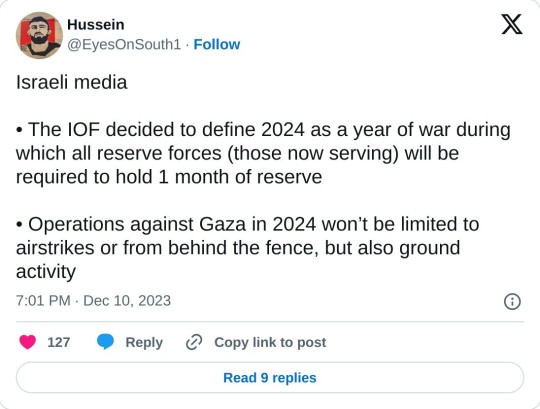
3 thoughts on this:
Economy - Israel's economy took a hit in October that was comparable to the economic tremors caused by the COVID-19 outbreak. It is effectively in a major recession today. The longer they drag out this war, the worse their economic condition will be. Foreign capital will continue leaving the country as it seems incapable of stabilising. While the continued use of reserves means 300,000 Israelis will be unable to work, not to mention the millions of dollars Israel has to spend to mobilise its reserve every day. The longer the war goes on, the more people will end up leaving the country. 470,000 have left in October and November with no intention of returning while over 300,000 settlers are internally displaced. Both of those numbers are bound to go up as the war continues. This means that Israel is missing hundreds of thousands of Israeli workers. A few weeks ago, Israel struck a deal with the Indian government to get 100,000 workers after tens of thousands of worker migrants fled the country. That plan fell through thanks to Indian trade unions. Now Israel is turning to African States in a desperate attempt to replace the Gazan workers it's currently genociding. We will see if that plan works as Africans are by and large pro Palestine. Plus the Yemeni naval blockade is growing more and more intense every week as a direct response to the genocide in Gaza. In short, Israel's economy can't withstand a long war. America cannot help prop up the economy as it will soon be facing its major economy issues in the coming years including a housing crisis and likely a recession.
Military defeats - Israel cannot defeat Hamas. It cannot win a war inside Gaza. It failed to do so in 2014, it's failing right now. It has lost hundreds of military vehicles including the (formerly) vaunted Merkava-4. The estimated number of injured soldiers stands at 10,000+ while the Resistance is still intact and capable of carrying out dozens of military operations against IDF and the surrounding cities and settlements every day. The IDF has never looked more weak than it is right now. Hezbollah has been employing a military strategy dubbed the escalation ladder, in which one end of the ladder is no war and the other end is total war. It has continuously escalated against Israel, attacking deeper and deeper into its territory, and it will continue until there's open war between Israel and Lebanon. The point of the escalation is to give Israel time to leave Gaza but as that's not something the Israeli government is planning on doing, we're looking at a region war in 2024 (so far we have a regional conflict and whilebits serious, it's not yet war). Just like it can't win in Gaza, Israel can't defeat Hezbollah and occupy Southern Lebanon like its leaders have been threatening to. It certainly can't take on the Ansar Allah group in Yemen.
West Bank - every week, there are clashes between Israeli forces and the Resistance in the West Bank and it's growing more and more intense. The best way to describe the region is 'powder keg.' Israel has responded to Oct 7th by detaining thousands of Palestinians and killing hundreds. There's a growing popularity of Al Qassam Brigades and other militant groups in Gaza. There also seems to be coordination between the Gazan and West Bank resistance groups, as in they would carry out operations at the same time. The longer the war on Gaza goes on, the more likely that war will also break out in the West Bank.
Many, many more Palestinians will die. This plan, more than anything, is a call for the continued slaughter of Palestinians in Gaza.
But the longer this goes on, the closer Israel gets to collapsing.
#yemen#jerusalem#tel aviv#current events#palestine#free palestine#gaza#free gaza#news on gaza#palestine news#news update#war news#war on gaza
1K notes
·
View notes
Text
Today is Malaysia's Independence Day so I drew the 141 celebrating it! :D Selamat Hari Mederka everyone

some info about the doodle introducing my country's stuff :D
Bunga Raya (the flower on Ghost's head) aka Hibiscus is our national flower

Soap is wearing Chinese traditional outfit (Sam Fu), Price is wearing Indian Shawl
Price is holding Chinese and Nyonya adjacent food: Pao and 9 layer kuih (pronounced as Jiu Chen Gao)


Ghost is holding Malay food: nasi lemak and Soap is holding ice coffee (we say "ais kopi ikat tepi" where drinks are stored in plastic bags)


Gaz is holding Indian food Roti Tissue (yes it's that tall!!)

The word "Selamat Hari Merdeka" is colored based on Malaysia flag color!

#merdeka#woooo enjoy your day fellow Malaysians!#:D#gummmyart#doodle#simon ghost riley#john soap mactavish#kyle gaz garrick#captain john price#task force 141#tf 141#scheduled post
292 notes
·
View notes
Text
i'm feeling controversial today so here's another hot take. and before you type away at your keyboards, know that this is all coming from a south asian.
white leftists have got to stop acting like christianity is the only religion that deserves to be criticized and you cannot touch any other religion because that'd be racist and bigoted. because as an indian who's watching my country progress towards hindu nationalism, this attitude doesn't help at all.
white people see hinduism as this exotic brown religion that's so much more progressive but don't know the violence of the caste system, how it others a large portion of the population on the basis of caste, literally branding them as "untouchables". they teach us in school that this problem is a thing of the past but the caste system is still alive and shows itself in violent ways. and that's not even covering how non hindus are treated in the country. muslims especially are being killed, have their houses bulldozed, businesses destroyed, and are being denied housing, our fucking prime minister called them infiltrators and there's this fear among hindu extremists that they'll outnumber the hindus in the country. portraying hinduism as this exotic religion does a disservice to all those oppressed by the hindutva ideology
similarly, white people see buddhism as this hippie religion that's all about peace but have no idea how extremist buddhists in myanmar have been persecuting the rohingya muslims for years and drive them out of the country.
if anything portraying these religions as exotic hippie brown religions is a type of orientalism itself.
and also y'all have got to realize that just because christianity has institutional power in america doesn't mean there aren't parts of the world where they are persecuted on the basis of religion. yes karen from florida who cries christophobia because she sees rainbow sprinkles on a cake is stupid but christian oppression DOES exist in non western countries where they're a minority. pakistani christians get lynched almost on a daily basis over blasphemy accusations. just look up the case of asia bibi, a pakistani christian woman who was sentenced to death on blasphemy charges because of something she said when she was being denied water because it was "forbidden" for a christian and a muslim to drink from the same utensil and she'd made it unclean just by touching it (which is ALSO rooted in casteism and part of pakistani christians' oppression also comes from the fact that a lot of them are dalit but that's a whole other discussion). and that's just one christian group, this isn't even going into what copts, assyrians, armenians etc have faced and continue to face. saying that christians everywhere are privileged because of american christianity actually harms christian minorites in non western countries.
and one last thing because this post is getting too long: someone being anti america doesn't automatically mean they're the good guys. too many times i've been seeing westerners on twitter dot com praise the fucking taliban just because they hate america. yes, the same taliban who banned education for women, thinks women should be imprisomed at home, and consistently oppresses religious and ethnic minorities in afghanistan. yes, america's war on afghanistan was bad and they SHOULD be called out for their war crimes there. no, the taliban are still not the good guys. BOTH of them are bad. you cannot pretend to care about muslims and brown people if you praise the taliban. because guess what? most of their victims are BROWN MUSLIM WOMEN. but of course white libs who praise them don't rub their two braincells together to make that conclusion.
this post has gotten too long and i've just been rambling so the point of this post is: white "leftists" whose politics are primarily america centric should stop acting like criticism of ideologies like hindutva, buddhist extremism, and islamic extremism BY people affected by these ideologies is the same as racism or religious intolerance because that helps literally no one except the extremist bigots. also america is not the centre of the world, just because something isn't happening in america doesn't mean it isn't happening elsewhere
#islamophobes do not fucking touch this post i swear#also talked more about india - and south asia in general - because i'm indian so i can speak on south asian issues more#this post got longer than i intended it#also didn't want to use the term islamist because that term has been primarily used by zionists and islamophobes#tagging all the countries i mentioned here#religion#india#pakistan#myanmar#afghanistan#rebecca talks
379 notes
·
View notes
Note
Hey! Can I suggest a tired & flustered Azul or Leona? Both are personal favorites
Hihi I gotchuu anon thank you for the requestt <3
also a bit off-topic but im indian-american (not native, like the asian country) and im the same shade as as leona which is why i hate hate hate when people talk about him blushing it'd be vy hard to see and i know its so weird and theyre good writers blah blah blah just a little pet peeve
Leona Kingscholar
You were currently being pulled into the arms of none other than the Prince of Afterglow, Leona Kingscholar. That wasn't particularly new - ever since you two started dating, Leona seemed to have a newfound love of cuddling you. It was pretty cute, actually. He really did act like a big cat sometimes.
Today, though, he seemed especially tired. He was always a bit tired - you knew why, and it wasn't a pretty story, but you had to digress - today, he seemed even more tired than usual.
It made sense. He had to pull an all-nighter yesterday catching up on paperwork for the Spelldrive club, something you still couldn't believe he'd actually done instead of just throwing the job onto Ruggie.
Still, he looked just about ready to collapse. You were getting pretty concerned.
"Wanna go to bed?" You asked, taking the opportunity to card your fingers through his hair. For once, he didn't try to hide the way he leaned into the touch. He pouted, though, and at that moment, you thought your heart was going to explode.
Leona, calm, always composed Leona was pouting at you. He looked almost like a kid right now.
You couldn't help the hearty laugh that escaped you. Leona huffed at you, angling his face in a way that made his dark circles much too prominent.
"Really, though," you said. "Get some sleep. I'll be here in the morning."
Leona mumbled something.
"What was that?"
"Come with me, herbivore," he said, more mumbled, and though it wasn't visible, you could tell he was blushing. The way he couldn't meet your eyes said it all.
He was surprisingly honest today.
He probably took your silence for teasing or the like, because he turned away with a huff.
"You can," he said. "I don't really care either way."
You smiled. It was genuine, not an ounce of teasing. You weren't going to do that, now when it was already so hard for him to be more vulnerable with you. It was overjoying just to know he was being honest.
"I'll take you up on that offer," you said, and that poorly hidden smile made every moment you'd have to spend listening to him snore worth it.
Azul Ashengrotto
Azul was working this evening. That was fine - he'd literally taken you out on a date so custom-tailored to you it made you wonder how exactly he knew you so well yesterday, you weren't going to complain about his performance as your beloved.
But he seemed tired. No, no, that was an understatement. He seemed like he was about to pass out any moment now. And yet, by some miracle, he was still working.
You had to perform well has his beloved, too. And that meant taking care of him when he was ill - or in this case, so tired he might as well have been.
"Azul?" you called out, and the thirty seconds it took him to process your voice and turn to look at you said it all. "Don't you think you should go to bed?"
After a few seconds, he shook his head blearily.
"'Can't," he mumbled, his words slurred. "Work."
You vaguely understood what he was trying to say. He couldn't sleep, he had work to do.
But it didn't seem like he was going to get much done in his current state other than pass out.
"Sleep, please," you said, and you were honestly shocked at how gentle your voice sounded. Being in love with Azul really did things to you, huh?
"But the money!" he whined, and you couldn't help but laugh. The money? That's what he cared about right now? How much money did he actually think he'd lose from sleeping? "'Want money."
This was the love of your life. This man.
Seeing you laugh, he huffed, cheeks bright red.
"Stop laughing," he said, pouting. "Ugh. 'S why you have no money."
Cold, Azul. Cold. Even in his current state, he had to remind you of your painfully broke reality.
"Then you'll have to help me make some, then." You said, trying to appeal to his love of rambling about finance. "Why don't you teach me? We can go to your room while we're at it, more privacy that way."
He nodded shakily, cheeks still a bit pink.
"I'm very-" he cut himself off, trying to pronounce somthing. "'Nevolent. Be-ne-vo-lent. I'll help you."
"Thank you so much," you said, and he followed you to his room.
You couldn't wait to see how embarrassed he'd get in the morning.
Bonus (Of sorts):
"I said what?"
"Yeah, and your face was so red! You kept slurring over your words, too. You couldn't even say 'benevolent'! Isn't that, like, your signature word?"
"Stop teasing me already!"
#azul ashengrotto#twisted wonderland#leona kingscholar#twst x reader#azul x reader#azul ashengrotto x reader#leona x reader#leona kingsholar x reader#azul ashengrotto x you#fluff#twst azul#twst#azul x you#leona x you#leona kingscholar x you#twst leona
449 notes
·
View notes
Text
Desi Parenthood, Adoption, and Stereotypes
I have a story set in the modern day with supernatural traces, with three characters: a young boy, his bio dad, and his adoptive dad. The boy and his bio dad are Indian, the adoptive dad is Chinese. The bio dad is one of the few people in the story with powers. He put his son up for adoption when he was a child because at the time he was a young single father, had little control of the strength of his powers: he feared accidentally hurting his child. The son is adopted by the other dad, who holds spite to the bio dad for giving up his son since he lost his father as a young age and couldn't get why someone would willingly abandon their child. This also results in him being overprotective and strict over his son. When the child is older, the bio dad comes to their town and the son gets closer to him, which makes the adoptive dad pissed, mostly acting hostile to the other guy, paranoid that he'll decide to take away the child he didn't help raise. Later when they get closer he does change his biases. I can see the possible stereotypes here: the absent father being the darkskinned character, the light-skinned adoptive dad being richer than the bio dad, the lightskinned character being hostile and looking down on the darkskinned character, the overprotective asian parent, the adoptive dad assuming the bio dad abandoned the son. The reason for his bias isn't inherently racist, but I get how it can be seen that way. Is there a way to make this work? Would it be better to scrap it?
Two problem areas stand out with this ask:
You seem confused with respect to how racial stereotypes are created, and what effect they have on society.
Your characterization of the Indian father suggests a lack of familiarity with many desi cultures as they pertain to family and child-rearing.
Racial Stereotypes are Specific
Your concern seems to stem from believing the absent father trope is applied to all dark-skinned individuals, when it’s really only applied to a subset of dark-skinned people for specific historical/ social/ political reasons. The reality is stereotypes are often targeted.
The “absent father” stereotype is often applied to Black fathers, particularly in countries where chattel slavery or colonialism meant that many Black fathers were separated from their children, often by force. The "absent black father" trope today serves to enforce anti-black notions of Black men as anti-social, neglectful of their responsibilities, not nurturing, etc. Please see the WWC tag #absent black father for further reading.
Now, it’s true many desis have dark skin. There are also Black desis. I would go as far as to say despite anti-black bias and colorism in many desi cultures, if one was asked to tell many non-Black desis from places like S. India and Sri Lanka apart from Black people from places like E. Africa, the rate of failure would be quite high. However, negative stereotypes for desi fathers are not the same as negative stereotypes for non-desi Black fathers, because racially, most Black people and desis are often not perceived as being part of the same racial group by other racial groups, particularly white majorities in Western countries. Negative stereotypes for desi fathers are often things like: uncaring, socially regressive/ conservative, sexist. They are more focused around narratives that portray these men as at odds with Western culture and Western norms of parenting.
Desi Parents are Not this Way
Secondly, the setup makes little sense given how actual desi families tend to operate when one or both parents are unable to be present for whatever reason. Children are often sent to be raised by grandparents, available relatives or boarding schools (Family resources permitting). Having children be raised by an outsider is a move of last resort. You make no mention of why your protagonist’s father didn’t choose such an option. The trope of many desi family networks being incredibly large is not unfounded. Why was extended family not an option?
These two points trouble me because you have told us you are writing a story involving relationship dynamics between characters of both different races and ethnicities. I’m worried you don’t know enough about the groups you are writing about, how they are perceived by each other and society at large in order to tell the story you want to tell.
As with many instances of writing with color, your problem is not an issue of scrap versus don’t scrap. It’s being cognizant of the current limits of your knowledge. How you address this knowledge deficit and its effect on your interpretation of your characters and the story overall will determine if readers from the portrayed groups find the story compelling.
- Marika.
I have one response: what? Where are the father’s parents? Any siblings? Is he cut off? Is he American? A Desi that has stayed in India?
Estrangement is not completely out of the question if the father is Westernized; goodness knows that I have personal experience with seeing estrangement. But you haven’t established any of that. What will you add?
-Jaya
#Black#Indian#South Asian#Desi#absent black father#stereotypes#tropes#adoption#colorism#research research research#parenting#strict Asian parents#Asian families
665 notes
·
View notes
Text
Places I Get The Good News:
Good News Network (they have a app)
GOOD News ( they have a app)
Lapis News (their website seems to be down but their app works)
Yes! Magazine (website and physical subscriptions but they dont paywall)
Hakai Magazine (they’re mostly independent environmental news for our oceans/coasts so not always GOOD news but they do celebrate the wins)
Monga Bay (is similar in that its not always good news but they do celebrate good things when they happen)
Indian Country Today (again, not always good news but when it is its amazing! and theyre just a really awesome source)
Wild Hope PBS (youtube)
Mossy Earth (youtube)
And I just try to keep my eyes and ears open for good news when it comes along~
#good news#hopepunk#climate news#news#environmentalism#science#environment#climate crisis#conservation#animals#nature
164 notes
·
View notes
Text
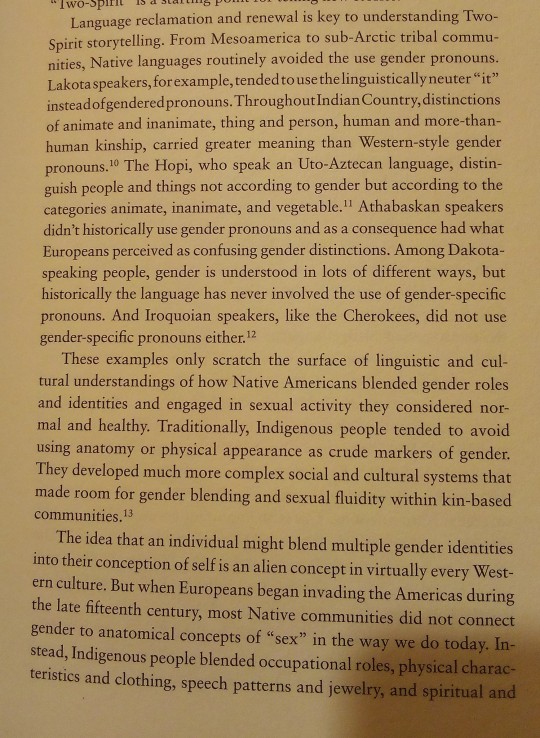
A passage from Reclaiming Two-Spirits: Sexuality, Spiritual Renewal & Sovereignty in Native America by Gregory D. Smithers.
[Image ID:
A photograph of a page from the book mentioned above, which reads:
"Language reclamation and renewal is key to understanding Two-Spirit storytelling. From Mesoamerica to sub-Arctic tribal communities, Native languages routinely avoided the use gender pronouns. Lakota speakers for example, tended to use the linguistically neuter "it" instead of gendered pronouns. Throughout Indian Country, distinctions of animate and inanimate, thing and person, human and more-than-human kinship, carried greater meaning than Western-style gender pronouns. The Hopi, who speak an Uto-Aztecan language, distinguish people and things not according to gender but according to the categories animate, inanimate and vegetable. Athabaskan speakers didn't historically use gender pronouns and as a consequence had what Europeans perceived as confusing gender distinctions. Among Dakota-speaking people, gender is understood in lots of different ways, but historically the language has never involved the use of gender-specific pronouns. And Iroquoian speakers, like the Cherokees, did not use gender-specific pronouns either.
These examples only scratch the surface of linguistic and cultural understandings of how Native Americans blended gender roles in and identities and engaged in sexual activity they considered normal and healthy. Traditionally, Indigenous people tended to avoid using anatomy or physical appearance as crude markers of gender. They developed much more complex social and cultural systems that made room for gender blending and sexual fluidity within kin-based communities.
The idea that an individual might blend multiple gender identities into their conception of self is an alien concept in virtually every Western culture. But when Europeans began invading the Americas during the late fifteenth century, most Native communities did not connect gender to to anatomical concepts of "sex" in the way we do today. Instead, Indigenous people blended occupational roles, physical characteristics and clothing, speech patterns and jewelry, and spiritual and... (text ends here)"
End image ID.]
#lgbtq#lgbt#two spirit#2s#lgbtq2ia+#queer#gender nonconforming#multigender#qpoc#indigenous literature#indigenous history#our pics#queer history#resources#reference
158 notes
·
View notes
Text
Hetalia characters with dishes typical for their country - part 1 (part 2 here)

Italy: Maritozzo (cream bread) -> This Roman milk bread is said to be dated back to times of Ancient Rome. The baked good is filled with generous amounts of whipped cream and somtimes decorated with fruit or pistachio. Young man also used it in courtship by hiding jewellery or a ring in the filling.

Germany: Breze(l) mit Schokolade (chocolate dipped pretzel) -> A baked pastry with sweet or salty toppings, best known for its distinctive symetrical, knotted shape. Dipped in chocolate the soft pretzel is a popular snack at funfairs and markets, but there are also small, crispy pretzels that are to be eaten like crisps/chips.

Japan: 和菓子 (wagashi; plant based sweet) -> Originally meaning "Japanese confectionery" the term now refers to a traditional dessert made from plant based ingredients. It's artful shapes are influenced by season, nature, or even poetry.

France: Quiche Lorraine -> A savoury tarte traditionally made with a filling of eggs, heavy cream, ham, and bacon. Today cheese is often added, though it is controversial among professionals. (In the drawing there seems to be leek added too which is not mentioned in the original recipe either.)

England: Scotch Egg -> Supposedly inspired by the Indian nargisi koftas, this dish consists of a hard-boiled or soft-boiled egg wrapped in pork (sausage meat) which is coated in breadcrumbs and then baked or deep-fried. Often served in pubs and a popular cold snack as well.

America: Hamburger -> A popular fastfood consisting of a patty (traditionally made from ground beef) between two halfs of a sliced bun. There are countless variations made with all kinds of additional ingredients and condiments, including expensive high-end versions with edible goldflakes.

Russia: пирожки́ (Pirozhki; stuffed bread) -> This popular street food is a baked good made from yeast-dough is typically boat-shaped and filled sweet or savory with meat, vegetables, fruit, jam or tvorog (an Eastern European fermented milk product with a consistency similar to curd cheese)

China: 小籠包 / 小笼包 (Xiaolongbao; steamed bun) -> Steamed dumplings made from leavened or unleavened dough traditionally filled with minced pork, traditionally eaten for breakfast. The top of the dumpling is closed by folding and pinching it. Authentical dumplings have at least 14 folds, preferably 18.
#aph england#aph america#aph france#aph russia#aph germany#aph italy#aph japan#aph china#hws italy#hws germany#hws japan#hws england#hws america#hws france#hws russia#hws china#hetalia#riva.edit#source in the source#full disclaimer I tried my VERY best to find everything but if I made a mistake pls let me know (politely)
160 notes
·
View notes